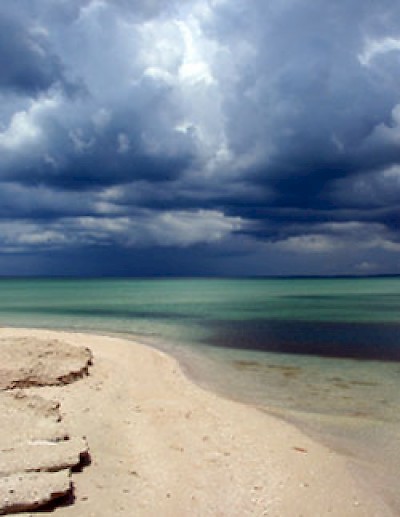New Yucatan Beach Law
Though we don't own property on the beach, we know lots of people who do or who want to! So when we heard about the law that was passed this last summer that prevents building within a certain distance from the Federal property line on the local Yucatan Gulf Coast beaches, we were mildly concerned. We asked some of our real estate acquaintances what they knew and what they thought about this new law.
Mitch Keenan, owner of Mexico International Real Estate, was on his way to the States when we asked him about it, with the text of this law as his reading material. He has promised a report back after reading it and discussing it with various colleagues familiar with Mexican laws.
Jennifer Lytle, owner of Tierra Yucatan and recently featured on our Yucatan Living Interviews, has this to say:
On July 21st on the afternoon he was leaving office, the outgoing Governor of Yucatan Patricio Patron Laviada passed a new law for the protection of the coastline. Studies had been ongoing for a number of years looking for recommendations to prevent further coastal erosion, to protect flora and fauna in sensitive breeding grounds, and to conserve the aquifers which provide most of Yucatan's fresh water.
This law consists of 96 pages of fine print, dividing the coastal areas from Celestun to San Felipe into many coded areas and assigning designations to each as to what can be built there and how.
It seems not to affect existing property in already developed urban areas, but will affect new construction along most of the coast. Exactly how it affects new construction will depend on the exact geographic coordinates of the property and varies widely from case to case. For those owning property, we will be happy to give you the exact details pertaining under the law if you will provide the coordinates.
In most areas, it will be possible to build on any lot of any size, provided the construction is raised above the ground on pilings at least 1.5 meters high to allow the free passage of water and wildlife on the beach. You may not destroy dunes or remove native plants, and where this has been done, the law requires that you help replant and rebuild the dunes.
In some areas, any new construction must be more than 60 meters from high tide - or 40 meters from the federal zone, and there are also restrictions on the percentage of land which may be covered by construction - varying from 10% to 20% in more isolated areas. There are certain height restrictions, but I must emphasize again that there are no general answers - everything depends on the exact location.
>
As far as implementation, as yet there is no specific authority in charge and the local people here are only just beginning to be aware that the law even exists. It is not being enforced, and construction, renovation and rebuilding is continuing without any modification. I am told that citizens groups are beginning to put forward constitutional challenges to the law, as if it is enforced it will have far-reaching effects on the value of property and especially land on the coast of Yucatan. I personally believe the law will soon be rescinded or greatly modified, as too many interests are at risk. As soon as I have more news, I will write an update. We are all anxiously waiting for clarification from the current state government.
Update as read in the Diario de Yucatan, October 15:
Decreto 801 Will be Modified: After the Commission of Evaluation and Continuity of the Committee of Ecological Regulation, which will occur in the next 15 days, spaces will be opened for public consultation destined to modify this disposition, which currently prohibits reconstruction and giving maintenance to houses that are less than 60 meters from the beach. On October 19, the Committee of Ecological Regulation will meet, for the purpose of installing the Commission of Evaluation and Continuity that will modify Decreto 801. This commission will open space for public comment, opinions, and revisions of everything relevant to the decree, indicated Eduardo Batlori Sampedro, head of the state Secretariat of Ecology.
So there you have it. Stay tuned to Yucatan Living for further updates as we have them.










Comments
maria luisa and bill 16 years ago
Is CasiYucateco an ordained minister? religious zealot? priest? shaman? all of the above? There seems to be nothing he does not know about. Should we be very afraid of him? or bow down before him? or both? Just wondering...
Reply
CasiYucateco 16 years ago
JOANNE: What you have is the peace-of-mind of knowing that you had attorneys who helped you navigate the rules.
What the "rule-breakers" will have (knowingly or unknowingly) is a "look over your shoulder they are coming for your house" worry the rest of the time the house is in the wrong spot, built wrong, built in violation of the law, etc, etc.
People get away with things in Mexico. And in the USA. And in Canada. But people also get caught in all those places too. It sounds like you've done what you should to avoid future problems. You've done what I would do. Now you can sit back in your comfortable home and watch the rule-breakers squeal like stuck pigs when they get caught. Or, maybe they won't be caught, but why worry about them?
As the Desiderata says: "always there will be greater and lesser persons than yourself. Enjoy your achievements as well as your plans. ... Exercise caution in your business affairs; for the world is full of trickery. But let this not blind you to what virtue there is -- many persons strive for high ideals -- and everywhere life is full of heroism." Be a hero!
Reply
Jo-Anne 16 years ago
Joanne: what lawyer did you use, and where did you build. We are coming to Mexico tomorrow (from Alberta) and would love to know what to do "before" signing anything.
Reply
JOANNE 16 years ago
I built a beachfront home in 2006 and had two good lawyers do all my legal work. It was done by the book. Now I moved here this past year and have seen things I just can't believe. People seem to be breaking every law that I had to live with when building my home. If I hear "Well, he knows somebody..." one more time! I've been told to my face "You just don't know the right people." How could I? I'm from Canada. I don't know anyone here and I know very little Spanish at this point. Is there a law here I've never heard of called 'The "do" and "cannot do" people law'?
Reply
Deborah 16 years ago
This makes sense! Anyone who considers purchasing land will be wise to build it off the ground (electrical and plumbing included) for long-term investments. On some of the Caribbean islands the same thing has happened and it has actually increased the value of the land.
Reply
Phil 16 years ago
Maria Luisa & Bill,
Your right my wife said that would be over kill. I'll check into it further...
Phil
Reply
maria luisa and bill 16 years ago
Phil, are you sure you want to be 12 (or 26?) feet above high tide? How exactly is that going to look/work? also, check height restrictions...(maybe we're not reading your comments accurately.)
Reply
Phil 16 years ago
Luchia John & Kathy,
Like you all we are in the process of buying a lot in Sunset Shores, Sisal Mexico. The lot is 82 feet wide and 348 feet deep. I would believe even with a 180 foot setback we should still be in good shape. We currently live on the water in Virginia. We have a 100 foot setback and I built my house 102 feet from the water.
This time we will build on piers that are 12 feet above mean high water. I don't want to worry about flooding. The lot is aprox. 14 feet above sea level so add another 12 feet would make the house 26 feet above sea level. I believe that a house above the ground would have little problem with passing a environmental impact study.
I am also would like to have a solar system installed. I have to say we are worried about buying and we are trying to get all the information we can. If anyone knows something that can help people like us please let us know.
Reply
CasiYucateco 16 years ago
I thought Working Gringos had posted contacts for English-speaking attorneys on the website, but I don't find it at the moment. If you are just getting started, you'll need to know that land purchases are only completed by a particular type of attorney called a "Notario" which is not anything at all like a Notary Public in the USA. (and I have no idea about Canada).
I'd advise contacting a long-time established Real Estate company like Mexico International (www.mexintl.com) who have long-term relationships with competent legal advisors. They've been in business longer than anyone else, as far as gringo-owned and oriented real estate companies.
And check all the real estate websites for beach lots to compare prices. Nearly $200K for a beach lot... better be a darned fine beach lot. To me (and I regularly pinch nickels until they squeak, so take that into account), that is an outrageous amount of money for undeveloped land with or without utilities.
Take a vacation for a week or so and poke around. A couple weeks would give you a feel for the lay of the land. At least you'd have an idea where things are and the current appearance, conditions, etc. Ask 10 ex-pats what to do and you'll likely get 20 answers. ;-)
Reply
Kathy 16 years ago
Thank you very much CasiYucateco for the information. We are just starting our quest for retirement property and have found the Yucatan area to be very appealing. I do agree with you as far as trying to find out as much information on your own with regards to development etc. But were does one start? I'm from Canada and have no connections to anyone within that area. My husband and I have a ton of questions, that we are finding very difficult to get a straight answer or even to find the trustworthy information source. The sources could be trustworthy but how does one know?
Reply
CasiYucateco 16 years ago
Note:
This law consists of 96 pages of fine print, dividing the coastal areas from Celestun to San Felipe into many coded areas and assigning designations to each as to what can be built there and how.
Sisal is between Celestun and San Felipe. Note that the generally accepted maximum size of a Fideicomiso-held lot is 2000 sq meters and be prepared for additional legal hoops when trying to buy something larger for residential property.
Reply
« Back (20 to 31 comments)Next »